- Home
- Tarryn Fisher
An Honest Lie Page 3
An Honest Lie Read online
Page 3
“Could be fun. You’re all about the human experience.” He was prodding her, and she’d have to give him something. “I could take care of all the details for you,” he said hopefully.
She chewed enthusiastically for several minutes to stall. How to explain that there were certain human experiences she had no desire to revisit? Grant didn’t know certain things and that wasn’t on him; she just wasn’t ready to let him see those parts.
“Wait a minute,” she said. “Did Stephen say something to you about this?” Stephen was Grant’s best friend and also Braithe’s husband. They’d gone to school together, and it was Grant who’d gotten Stephen the job with his company.
He glanced up at her and she could see the guilt in his eyes. She waited to see what he would say, her nerves spiking. Her foot began a vigorous side-to-side shake under the table.
“Stephen did mention that they were going to invite you on their trip. To be honest, I thought you’d want to go. And,” he continued, “my work trip is coming up. I’d feel better if you weren’t alone up here the entire time.”
“I won’t be alone,” she said, glancing at Shep, who was asleep in the corner. It sounded nice actually: a few days of uninterrupted work would allow her to catch up on things.
“Rainy, I’m serious. If you get a random snowstorm while I’m gone, you’re going to be trapped up here without power. The soonest I can get the generator installed is late spring.”
“We can manage,” she said, sounding more confident than she felt. “If the power goes out, I can build a fire, and we have plenty of supplies, don’t you think?”
Grant made a face, and she knew what he was thinking: city girl. And that had been true of the last decade. But Rainy hadn’t always lived in the city: quite the opposite.
And anyway, what was she supposed to say? I’ve survived worse than a snowstorm? I’m terrified of people, not nature?
“All I’m saying is, if you have the chance to get out of here before bad weather hits, take it.”
“And what about Shep?”
“Are you kidding? He loves going to Mr. Bean’s house.” Mr. Bean was their closest neighbor, and his name was actually Mr. Beade; Grant had come up with the nickname, saying he looked like the TV character. She couldn’t tell him that it was Nevada she was afraid of, not snowstorms, and that she’d rather starve here than go there.
“I’ll think about it,” she lied.
After they ate, Grant cleaned up while she went down to her studio. It was an industrial space with heated concrete flooring and the same floor-to-ceiling windows that the upper levels boasted. There were doors to two adjacent rooms: one that she used for her office, and the other held a full-size bed that she crashed in when she worked late nights. The area was large, and there was also a garage-door entrance, which allowed her to get her larger pieces in and out easily. She was working on a sculpture for a private commission, a beehive using wire as its base. She stepped over the mess she’d made earlier in the day and walked briskly to the little windowed room that held her desk and computer. There wasn’t much privacy in there, and at any moment Grant could walk into her studio and see her through the glass, but he hardly ever came down, saying he wanted to give her space. She sat down at her desk and only then did she allow herself to feel what she’d been holding in. It was as if balloons of anxiety floated in her belly, bloated and ready to burst at any moment. She bent over her desk until her cheek rested on the cool surface and waited for the feelings to pass, breathing deeply as tears ran in a steady stream down her cheeks. She felt frozen, unable to navigate through the maze of emotion that had taken over.
“It’s over,” she said, her voice husky and thick with tears. “You’re gone from that place and that time.”
* * *
Rainy hid in her studio that night, plugging her earphones into her ears and turning up her music until it was time for bed. Then, in an exhausted zombie shuffle, she walked the three flights of stairs to their bedroom and fell into a dreamless sleep until morning.
She woke alone with the rain sprinkling the window. Rolling over, she was sad to see Grant had left for work, his side of the bed rumpled. Grant was an architect in the city, and had a love of sculptures in particular. He’d visited her show in New York while he was at a conference and bought a piece called Our Father in which she’d used industrial metal wires to construct a man’s face. The face, Grant claimed, looked just like his dead grandfather’s. He’d paid thirteen thousand dollars for the four-foot sculpture, while confessing to Rainy he’d seen her work in an architectural magazine, and then he’d asked her out on a date.
She’d been flattered, of course, and she’d gone back to his hotel room that night and proven that flattery will get you anywhere with an artist. Over the next year, he’d made several trips back to see her, and eventually their meetups developed feelings.
Deep feelings. She still didn’t quite know why she’d done it. Her entire life was in New York, her friends and business acquaintances; and yet, when he’d offered her the chance at a wet mountain life, she’d taken it.
She’d moved out of her studio apartment in Soho nine months later and made the trek to Washington state with Shep in tow and fear trailing behind her. No matter where she went, no matter who she was with—
One day, Taured would come for her.
3
Then
What she remembered about that first day was sitting in the back seat of their old Monte Carlo, her bare legs sliding along the leather because of how much she was sweating. The air-conditioning had never worked in the Tin Crap, as her mama called it, and it smelled like maple syrup for some reason. The radio was the only thing that provided some comfort of home, playing songs they could sing along with, like the Cranberries and Destiny’s Child. They’d driven from California, sleeping in the car at rest stations and Walmart parking lots, eating peanut butter sandwiches when they got hungry. Summer still felt sick about the way they’d left: in the middle of the night so that the landlord wouldn’t see them. No goodbyes, no nothing. And they could only take what could fit in the Tin Crap—which was practically nothing. She’d had to leave her books behind and the telescope her dad bought her for her birthday. Now, they were headed to Nevada, where her mama had a friend who could help.
“What type of help do we need exactly?”
Her mother blew air out of her nose; glancing to the right, she honked at a car and sped around it. “We need everything, Summer! A place to live. I need a job, support, God...not in that order.” Her mother’s braid hung between her shoulder blades, thick and shiny, as she leaned forward to change the radio station. She bypassed a couple songs Summer liked, only to stop on a station that was playing the blues. Summer rolled her eyes, falling back against the seat. The change in music seemed to make her mother happy; she rolled the window down all the way and sang out at the desert. Her nails were painted a deep red, chipped at the tips. Normally, she never let her nails look like that, but things had been weird lately. Her mother was always tired, always working, always crying. Not in that order.
“Who is your friend?”
This time her mother met her eyes in the rearview mirror. She turned down the radio and pulled a piece of hair out of her mouth before answering.
“We were friends when we were kids. I haven’t seen him in a long time, but we kept in touch. Kind of, anyway...and when your dad died, he reached out to see if there was anything he could do.”
“Like what? Bring him back from the dead?”
There were a couple minutes of prickly silence as her mother stared her down in the rearview mirror. Summer, who was sitting in the back seat as protest for this whole ridiculous trip, looked out the window.
“Hey! Promise me you aren’t going to run your mouth like that when we get there. The last thing I need is—”
“I’m not trying, Mama!” And it was true: the first thing that came to her mind always seemed to shoot out of her mouth like shrapnel.
“You sound like your father.” Her mother’s voice was wounded, but Summer felt stung, too. You sound like your father were mean words from Lorraine, who’d spent the whole of Summer’s life complaining about the man. She didn’t want to talk about her dad, anyway. When she thought about him her chest hurt with how empty it was. The word dead, which had held little meaning to her before, could now trigger a frenzy of bad electricity in her chest.
She knew enough about how people worked to formulate her next question. “What does he need from us?”
“Nothing.” Her mother rested an arm across the bench seat, steering with her left hand. There had been nothing but flat red dirt for hours. “Some people just care, they want to help.”
Where were these people when her dad needed help? But she didn’t say that—couldn’t say it—or she’d get in trouble.
Lorraine caught her daughter’s eye via the rearview mirror again, two brown orbs of intensity.
“There will be plenty of kids your age. And we’re all going to live together, contribute together and be a community.”
“Dad hated socialism.”
“It’s like this experiment, really,” she explained, obviously pretending she hadn’t heard Summer. “Taured was this...this...gangly teenager with adult ideas. It was hard to take him seriously until he started speaking, then everyone would shut up and listen. Anyway, he had this idea when we were just kids and it’s neat being able to be a part of helping him build it.”
“If you’ve been friends with him for so long, why have I never heard of him?”
Lorraine tensed, her arm sliding off the back of the seat where it had been resting.
“Your father didn’t like me having friends, least of all male ones.”
Her mother had never said anything like that to her before. Summer straightened in the back seat, her body tightening with this secret.
“Why not?”
“He was jealous.”
She pictured her dad’s big smile and bigger sideburns and something flipped uncomfortably in her chest. In her memory, his face took on a strange look—the light in his eyes snuffed out and burned like coals. Now that it had been said out loud, she could see it: her dad’s crazy moods. He had yelled at her mom a lot. She always put her Walkman on when they were fighting, but sometimes she heard snippets of what he was yelling. When she looked up, her mom was studying her in the rearview mirror.
“He was different with you than he was with me,” she said simply.
They hadn’t known a lot of people in California, just her dad’s family, and they were kind of strange, but it was still the only place she’d ever lived. Her mama had left her family behind when she’d met Summer’s dad and gotten pregnant. As much as Summer scanned her memory, she couldn’t recall a time her mom had friends over or went out to lunch with someone. Anger bounced up into her chest and she didn’t know what to do with it: anger at her dad, anger at her mom—she was even mad at herself.
“You hate talking about Dad.” Her voice was hurt, accusatory. Again, it had just sprung into her head and she’d said it.
“I don’t,” her mother said, and then she sighed deeply. “Look, Dad owed a lot of people money. That’s why we had to leave. Awful people...no, scary people,” she corrected herself. “We couldn’t stay there.”
“Why couldn’t you keep babysitting and pay them back?” Summer asked.
“Hon...” Her mother’s voice was strained. “I could babysit for the rest of my life and still not be able to pay those guys.”
“Okay.” It was the best peace offering she could make.
“It’s you and me now, kiddo.”
“And, like, all the people we’re going to live with.”
Her mother’s laugh filled up the whole car and Summer felt happy again. Sometimes the things she said made her mother upset, and other times she’d laugh harder than Summer had ever heard. She tried not to say the wrong things, but it was hard to know what exactly it was that made adults upset—they were like seesaws.
An hour later, a row of small, stucco homes appeared on their right: they looked like toenails painted pink and green and yellow.
“Is that it?” Summer asked, scanning the desert for more homes and seeing only scrub bushes.
“The town is called Friendship, isn’t that cute?” Lorraine said, ignoring her. She pointed to the sign as they sped by and Summer caught a glimpse of the name with the words Established 1913 beneath it.
“Why is there a town way out here?”
“It was a mining town, part of the boom at the turn of the century, I’m guessing. When the minerals run out, the people do, too.”
They passed a row of buildings and she craned her neck around to see what they were: a diner, a place called Red’s and a two-pump gas station next to what looked like a motel...then more nothing. That was it. She slouched back in her seat, disappointed. When her mama had told her they were going to Nevada, she’d been excited about the bright, flashing lights of Las Vegas. But Vegas was at least an hour from where they were going. Friendship was just a boring town in the middle of the desert.
“There’s some kind of famous cactus back there. People drive from all over to see it!” Lorraine was using her overly cheerful voice, something she did when she was nervous.
Summer hated when adults tried to make boring things sound fun; who did they think they were fooling, anyway?
“Cool.” She traced the stitching on the back of the seat, not bothering to look.
Her mother, who usually called her out when she was rude, was leaning all the way forward in her seat, oblivious as she studied the road ahead of her.
“It should be coming up...”
Summer rolled her eyes but scanned the desert for it, anyway.
“Does it look like a prison?” She’d seen them on the Lifetime movies her mother watched: gray places with bars over the windows and people dressed in orange.
“Don’t think of it like a prison,” her mother said. “He’s renovated the inside with the money his adoptive mother left him.” She was checking her reflection in the rearview mirror. “It’s more like living in an apartment building. They have a vegetable garden, an apricot orchard and goats and chickens. There’s a cafeteria where everyone has their meals together.”
“He”: her mother’s friend—the help-promiser. “Are the goats and chickens in prison, or to be eaten by the prisoners?” She’d meant for it to be funny, but by the look on Mama’s face, she’d said the wrong thing again—the thing her dad would have said. Summer could taste the dust from outside coating her mouth.
“Sorry,” she said quickly, not wanting to ruin the mood. “Can I have a sip of that water?”
The plastic water bottle crackled when Summer took it from her mother’s hand. She was lifting the bottle to her lips when an odd shape rose out of the desert, on her right.
“Look, is that it?” She pointed out the window at the pale building that rose out of the dirt like a squat sandcastle. A single road led down to the building. To reach it, they would have to pass through a gate. The gate was an ugly, solid, metal thing; Summer resented that she couldn’t see through it, but now someone was stepping out of the little shack to their left and she switched her attention to the thickset woman wearing a guard’s uniform.
Her mama said a bad word, tapping her fingers on the steering wheel like she did when she was nervous. “Summer, sit back,” she said.
The woman was around her mom’s age, and she had crunchy-looking blond hair that zigzagged out from her head like electrified noodles.
Noodles took a step toward the car, scanning the road behind them like she was waiting for an ambush or something.
“Name?” This one word, spoken through her teeth, with no smile to accompany it.
“Lorraine,” her mama said to the woman. She said it in the nice voice she reserved for Summer’s teachers. The woman didn’t react to the name or her mama’s friendly tone. She didn’t check a list or smile; she stared straight at Mama—stuck her jaw out at her, even. And then, in a less friendly voice, she heard her mama add, “Taured is expecting us.”
Bending at the waist, like she hadn’t heard, Noodles scanned the interior of the car for...what? Summer scanned along with her, looking for a problem. There was none. They both seemed to come to this conclusion at the same time. “Pop the trunk.” The woman’s voice was deep and impatient.
It came as an order, not a request. Summer felt rather than saw her mama tense. Sometimes she thought she could hear her mother when no one else could, feel her feelings, and she couldn’t really explain that to anyone, because it was weird. The trunk unlatched and she heard things being moved around. A few seconds later, the woman reemerged next to the driver’s-side window. She nodded to Summer in the back seat and stepped into the shed, picking up a walkie-talkie. She turned her back to them when she made the call, and Summer watched her walk back into the little shed, nod and press a button to open the gate. The two solid metal doors opened to reveal a long stretch of road.
Mama let go of the brake and the car bounced through the gate. Summer spun her head around, gripping the back of the seat with both her hands to stare out of the back window at Noodles. She was watching them.
“What a nutjob,” she said, turning back to face the front.
“Don’t say things like that. You have no idea what you’re talking about.”
“Daddy would have thought she was.”
“Enough!” Lorraine’s voice was angry, and her eyes were worse; Summer looked away, at the sandcastle, instead. The closer they got, the less interesting it looked. She wanted to go home.
“Remember what I told you,” Mama said.
“You’ve told me a lot of things.” She could feel her mother’s eyes in the rearview mirror, but she refused to meet them. Instead, she focused her gaze outside the window and on the bumping of the car as it rolled over the battered road. The closer they got, the more disappointing the scene: dirt, more dirt and then a dusty parking lot holding eight crappy cars.

 Jackal
Jackal F*ck Love
F*ck Love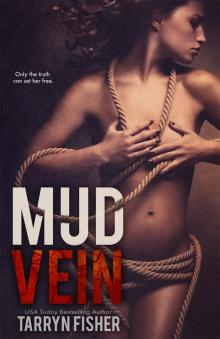 Mud Vein
Mud Vein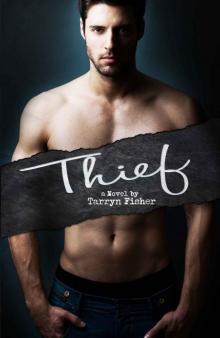 Thief
Thief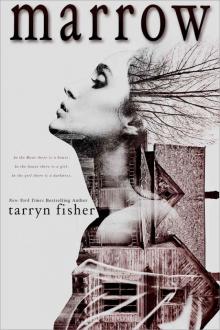 Marrow
Marrow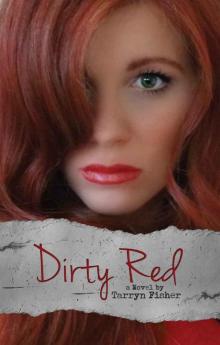 Dirty Red
Dirty Red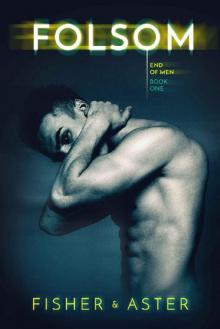 Folsom
Folsom The Opportunist
The Opportunist Atheists Who Kneel and Pray
Atheists Who Kneel and Pray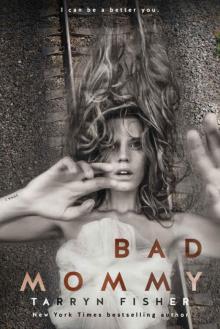 Bad Mommy
Bad Mommy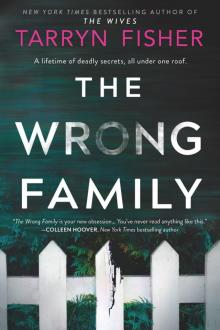 The Wrong Family
The Wrong Family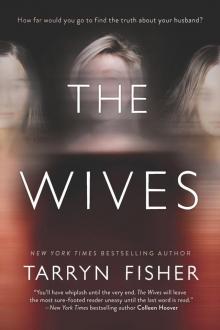 The Wives
The Wives Jackal (The End of Men Book 2)
Jackal (The End of Men Book 2)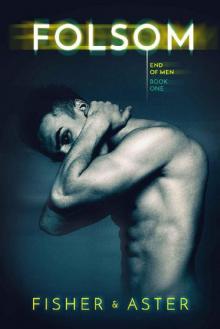 Folsom (The End of Men Book 1)
Folsom (The End of Men Book 1)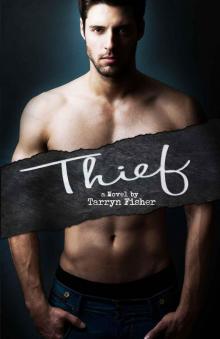 Thief (Love Me With Lies #3)
Thief (Love Me With Lies #3)